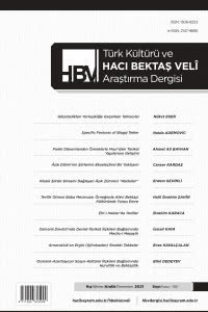DERVİŞ DİNDARLIĞINDA MİTLER VE ETİK
MYTHS AND ETHIC IN DERVISH PIETY
___
Aktürk, Hamit und Tuğrul, Talip. (2014). "Alevi Bektaşi Kaynaklarinda İnsan Yetiştirme Modeli." Türk Kültürü ve Hacı Bektaş Veli Araştırma Dergisi, 72: 211- 225. URL: http://www.hbvdergisi.gazi.edu.tr/index.php/TKHBVD/article/ view/1622.Arda, Zeki Cemal. (1999). "Anadolu ve Avrupa Mitolojisinde İçerik ve Motif Karşılaştırması." Türk Kültürü ve Hacı Bektaş Veli Araştırma Dergisi, 9. URL: http://www.hbvdergisi.gazi.edu.tr/index.php/TKHBVD/article/view/249/0.
Bashir, Shahzad. (2005). Fazlallah Astarabadi and the Hurufis. Oxford: Oneworld.
Birge, John Kingsley (1937): The Bektashi Order of Dervishes. London: Luzac.
Cantoni, Davide. (2015): "The Economic Effects of the Protestant Reformation: Testing the Weber Hypothesis in the German Lands". Journal of the European Economic Association, 13 (4): 561-736. DOI: 10.1111/jeea.12117.
Demir, Ali. (2016). Die Moderne. Von Muhammad zu Atatürk: eine Analyse des türkischen Pfades in die Moderne anhand der Theorie des kommunikativen Handelns von Jürgen Habermas. Berlin: Lit-Verlag.
Durkheim, Emile. (1981). Die elementaren Formen des religiösen Lebens. Frankfurt am Main: Suhrkamp
Eyüboğlu, İsmet Zeki. (2010). Bütün yönleriyle Bektaşilik. İstanbul: Derin.
Faroqhi, Suraiya. (1981). Der Bektaşi-Orden in Anatolien: Vom späten fünfzehnten Jahrhundert bis 1826. Wiener Zeitschrift für die Kunde des Morgenlandes. Sonderband 2. Wien: Verlag des Institutes für Orientalistik der Universität Wien.
Godelier, Maurice. (1979). "On Infrastructures, Societies, and History: Reply." Current Anthropology, 20 (1): 108-111. URL: http://www.jstor.org/ stable/2741867.
Goffmann, Erving. (2002). Wir alle spielen Theater. Die Selbstdarstellung im Alltag. Piper: München.
Gökbel, Ahmet. (1998). "Kangal Yöresinde Ziyaret Yerleri". Türk Kültürü ve Hacı Bektaş Veli Araştırma Dergisi, 7: 116-138. URL: http://www.hbvdergisi.gazi.edu. tr/index.php/TKHBVD/article/view/111.
Gölpınarlı, Abdülbaki. (1973). Hurûfîlik Metinleri. Ankara: Türk Tarih Kurumu Basımevi.
Gross, Erich. (1927). Das Vilâjetn-Nâme des Hağği Bektaş. Ein türkisches Derwischevangelium. Leipzig: Meyer & Müller.
Habermas, Jürgen. (1976). Zur Rekonstruktion des historischen Materialismus. Frankfurt am Main: Suhrkamp.
--. (1981). Theorie des kommunikativen Handelns. Band I. Handlungsrationalität und gesellschaftliche Rationalisierung. Frankfurt am Main: Suhrkamp Verlag.
--. (1983). Moralbewusstsein und kommunikatives Handeln. Frankfurt am Main: Suhrkamp.
--. (1991). Erläuterungen zur Diskursethik. Suhrkamp: Frankfurt am Main.
--. (1998). Faktizität und Geltung. Beiträge zur Diskurstheorie des Rechts und des demokratischen Rechtsstaates. Frankfurt am Main: Suhrkamp Verlag.
Hanyu, Tatsuro (1993). "Max Webers Quellenbehandlung in der ,Protestantischen Ethik'. Der Begriff ,Calling'. " Zeitschrift für Soziologie, 22 (2): 65-75. URL: https://www.jstor.org/stable/pdf/23845926.pdf.
Hasanoğlu, Enver (1998). "Cumhuriyetimiz ve Hacı Bektaş Veli." Türk Kültürü ve Hacı Bektaş Veli Araştırma Dergisi. No. 7:10-12: URL: http://www.hbvdergisi. gazi.edu.tr/index.php/TKHBVD/article/view/99.
Hess, Michael Reinhard. (2009). Die Sprache des Menschengottes: Untersuchungen zu Imad äd-Din Näsimis (fl. ca. 1400) türkischem Divan. Aachen: Shaker.
Huff, Toby E. (2003). The Rise of Early Modern Science: Islam, China, and the West. Cambridge: Cambridge University Press.
İhde, Don (1967). "Rationality and Myth." Journal of Thought. 2(1): 10-18. URL: http://www.jstor.org/stable/42587996.
Kafadar, Cemal. (1995). Between the Worlds: The construction of the Ottoman State. Berkeley: University of California Press.
Lévi-Strauss, Claude. (1977). Strukturale Anthropologie. Frankfurt am Main: Suhrkamp
Levtzion, Nehemia. (1987). "Aspekte der Islamisierung: Eine kritische Würdigung der Beobachtungen Max Webers." Wolfgang Schluchter (Hrsg): Max Webers Sicht des Islams. Interpretation und Kritik, S. 142-155. Suhrkamp: Frankfurt am Main.
Onat, Hasan. (2010). "Über die Bedeutung und Wichtigkeit des ,Velayetname' in der Tradition von Ahmet Yesevi und Bektas Veli/ Ahmet Yesevi- Hacı Bektaş Veli Çizgisinde ,Velayetname' nin Anlam ve Önemi Hakkında." Forscehungszeitschriff über Alevitentum und Bektaschitentum / Alevilik-Bektaşilik Araştırmaları Dergisi. Nr. (3): 46-54.
Pala, İskender. (1998). Ansiklopedik divân şiiri sözlüğü [Enzyklopädisches Wörterbuch der Divan-Dichtung]. İstanbul: Ötüken.
Sevinç, Bayram. (2013). "Ontolojik Mekân Siyasası ve Mabet". Türk Kültürü ve Hacı Bektaş Veli Araştırma Dergisi, 67: 51-69. URL: http://www.hbvdergisi.gazi.edu.tr/index.php/TKHBVD/article/view/1389.
Townsend, Dabney W. (1972). "Myth and Meaning." The Centennial Review, 16 (2): 192-202. URL: www.jstor.org/stable/23738355.
Trubek, David M. (1984). "Max Weber über das Recht und die Entstehung des Kapitalismus." Stefan Breuer und Hubert Treiber (Hrsg.): Zur Rechtssoziologie Max Webers: Interpretationen, Kritik, Weiterentwicklung, S. 152-198. Opladen: Westdeutscher Verlag.
Verene, Donald Philip. (1979). Symbol, myth and culture: essays and lectures of Ernst Cassirer 1935-1945. New Haven: Yale University Press.
Weber, Max. (1904). "Die ,Objektivität' sozialwissenschaftlicher und sozialpolitischer Erkenntnis" Archiv für Sozialwissenschaft und Sozialpolitik. 19. Band, Heft 1: 22-87.
--. (1980). Wirtschaft und Gesellschaft: Grundriss der verstehenden Soziologie. Herausgegeben von Johannes Winckelmann. Studienausgabe. Tübingen: Mohr Siebeck.
--. (1986a). Gesammelte Aufsätze zur Religionssoziologie. Die Wirtschaftsethik der Weltreligionen. Vergleichende religionssoziologische Versuche. Band II. Mohr: Tübingen.
--. (1986b). Gesammelte Aufsätze zur Religionssoziologie. Die protestantische Ethik und der Geist des Kapitalismus. Band I. Mohr: Tübingen.
--. (1988). Gesammelte politische Schriften. Herausgegeben von Johannes Winckelmann. Mohr: Tübingen.
Wise, Tigger. (1985). The Self-Made Anthropologist: a Life of A. P. Elkin. Syndey: George Allen and Unwin.
- ISSN: 1306-8253
- Yayın Aralığı: 4
- Başlangıç: 1994
- Yayıncı: Ankara Hacı Bayram Veli Üniversitesi Türk Kültürü Açısından Hacı Bektaş-ı Veli Araştırmaları Uygulama ve Araştırma Merkezi
DAĞ, SU VE MAĞARA KÜLTLERİ BAĞLAMINDA ANKARA HÜSEYİN GAZİ TÜRBESİ
TURGAY NAR'IN CAN ATEŞİNDE KANATLAR (MEVLÂNÂ) OYUNUNDA VAHDET-İ VÜCÛD DÜŞÜNCESİ
ARNAVUTLUK-KRUJA’DAKİ SARI SALTIK MAKAMI ETRAFINDA GELİŞEN İNANÇ VE RİTÜELLER
ERKEN DÖNEM TASAVVUFU VE TÜRK TASAVVUFUNDA SEYR Ü SÜLÛK (METİN MERKEZLİ BİR İNCELEME)
TÜRK DÜNYASININ ORTAK DEĞERİ OLARAK "AKIL" KONULU ATASÖZLERİ
ALEVÎ/KIZILBAŞLIK'TA OCAK KÜLTÜ
DERVİŞ DİNDARLIĞINDA MİTLER VE ETİK
BULGARİSTAN'DA BEKTAŞİLİK- ELMALI BABA DERGAHI'NA AİT 16. YY TARİHLİ BİR VESİKANIN NEŞRİ
16. YÜZYIL OSMANLI SARAYLARINDA AZERBAYCANLI HATTAT VE KATİPLER
KADININ TOPLUMSAL CİNSİYET ROLLERİNİNİN TÜRK HALK NİNNİLERİNE YANSIMALARI
